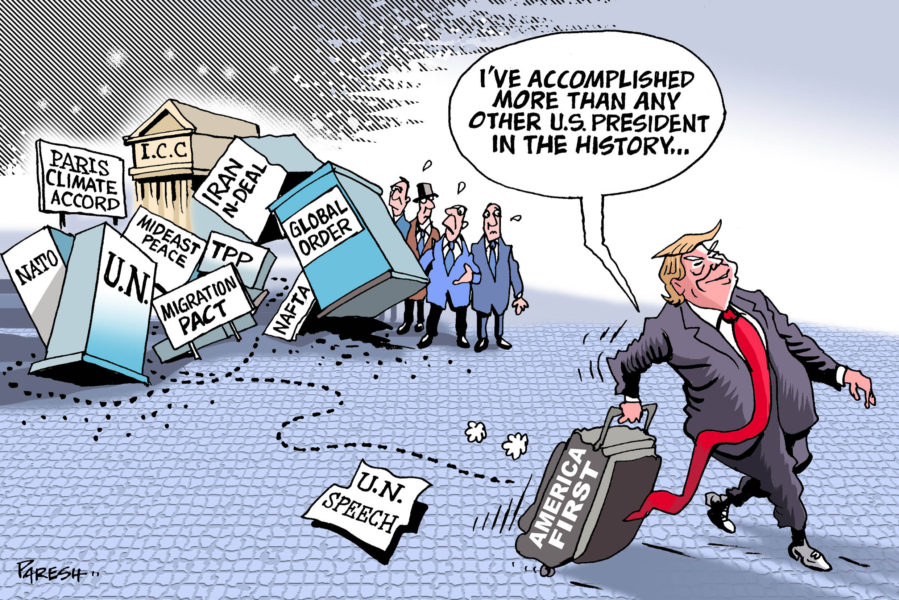
Wang Yi Poses 4 Questions: America Should Be Ashamed!
Perhaps the United States feels isolated these days.
On Aug. 14, America failed to persuade all but one of its allies on the United Nations Security Council to support its draft resolution indefinitely extending the arms embargo on Iran. On the 20th, key U.S. allies, the United Kingdom, France and Germany, issued a joint statement rejecting the American proposal to “quickly reinstate sanctions” on Iran. Additionally, Chinese and Russian diplomats also expressed opposition to the same U.S. proposal.
Just yesterday, Aug. 21, Chinese state councilor and foreign minister Wang Yi stated in a joint meeting with Pakistani Minister of Foreign Affairs Shah Mahmood Qureshi that the U.S. was being “entirely unreasonable.” He posed the following four questions: Has America considered the axioms of the international order? How can the U.S. possibly draw upon the credibility of international law? Where has the credibility of the U.S. gone? Where is the logic in America’s decision-making process?
These four questions should make America embarrassed. There is a reason why no nation supports the American push to sanction Iran. These are the consequences of America making global decisions on its own.
First, the U.S.’s “breach of contract” is what caused all this quarrel.
The Iran Nuclear Deal is a crucial part of global nuclear nonproliferation efforts, upholding peace both globally and regionally. According to the accepted norms of international relations, every major nation has since signed nonproliferation agreements and, in doing so, performed its duty toward the international community, whether for international credibility or their own national security. Regrettably, the U.S. unilaterally withdrew from the Iran Nuclear Deal in May 2018. The U.S. not only violated Security Council Resolution 2231 but it even blocked other parties from implementing the agreement, causing continued tension. Years of hard work on the part of the international community had gone entirely to waste. Reducing sanctions on Iran in exchange for its compliance with nuclear arms reduction was a crucial part of the Iran Nuclear Deal. Now, as America pushes to reinstate sanctions on Iran, it is further ruining the spirit of the original agreement. For the U.S., merely pulling out of the agreement is not enough — it must also destroy. Along with the agreement, isn’t the U.S. also destroying its own credibility?
Second, as the party who pulled out of the agreement, America has no right to demand the Security Council reinstate sanctions.
Leaving the agreement was a unilateral decision made by the U.S.; this means that it has already lost the rights granted to the agreement’s signatories. It has no right to demand that the Security Council “quickly reinstate sanctions”. This should be obvious to any member of the international community. Among the five permanent members of the U.N. Security Council, every country except the U.S. has pointed out the fact that the U.S. was no longer a participant in the agreement. This point has also been recognized by legal experts such as Larry Johnson, associate professor of law at Columbia University in the U.S. and former assistant secretary-general for legal affairs at the U.N. Johnson pointed out that the "quick restoration of sanctions" can only be initiated by the participants in the Iran Nuclear Deal; since the U.S. is no longer a participant, its demands to reinstate sanctions have no legal basis. Even though America withdrew from the agreement, it still wants to exercise its now dated and invalid legal rights. Isn't this challenging the authority of international law?
Third, America’s intimidation of other nations to get them to comply with its will is nothing but an unsubstantiated display of power.
“When persuasion fails, resort to force” seems to have become a hallmark of U.S. foreign policy over the past few years. After America walked away from the Iran Nuclear Deal, its demands for the U.N. to impose sanctions on Iran is completely unreasonable. It even threatened sanctions on nations that did not cooperate after no major power supported its proposal. America only cares about its own interests; it does not care about the consequences other nations have to bear, nor the regional and global instability that might proliferate in the absence of this agreement. It does not care about its own responsibility in enforcing the agreement, nor does it care about the painstaking effort other nations have put into safeguarding international peace. Now, when America fails to comply with international law, it demands that other nations do the same, even going so far as to wantonly threaten the use of force against countries that refuse. Of course, this is a direct violation of international norms. As Wang Yi asks, what kind of absurd “logic” is this?
Given its overbearing behavior, it’s no wonder America could not get any support. It is also no wonder that, in the past few days, many American media outlets have reported on how Mike Pompeo and Donald Trump suddenly found themselves isolated on the issue of sanctioning Iran in the international arena. The New York Times put it quite bluntly: Although the Trump administration wants to isolate Iran, its unsuccessful diplomacy may be a symptom of its increasing isolationism. This is the most vivid portrayal out there.
At the opposite end of the spectrum, China has an entirely different view of the Iran issue. China has always put its all into ensuring that major powers signed onto such agreements and encouraged multilateral dialogue and understanding. China has also put forth many suggestions on establishing another multilateral platform to uphold the Iran Nuclear Agreement. China undoubtedly holds a sense of active duty toward maintaining world stability. Be it contributing to nuclear nonproliferation, multilateral solution-making or abiding by international norms to maintain global peace, China aligns itself with other major powers. China and America stand on opposite sides of the spectrum, reflecting a major, fundamental divide in political thought.
More than two years have passed since America reinstated sanctions on Iran. Has Iran been suppressed? No. Has America received international support? Apparently not. Clearly, if the U.S continues to pursue its own path, it will continue to raise doubt in the international community and deepen its own isolation.


